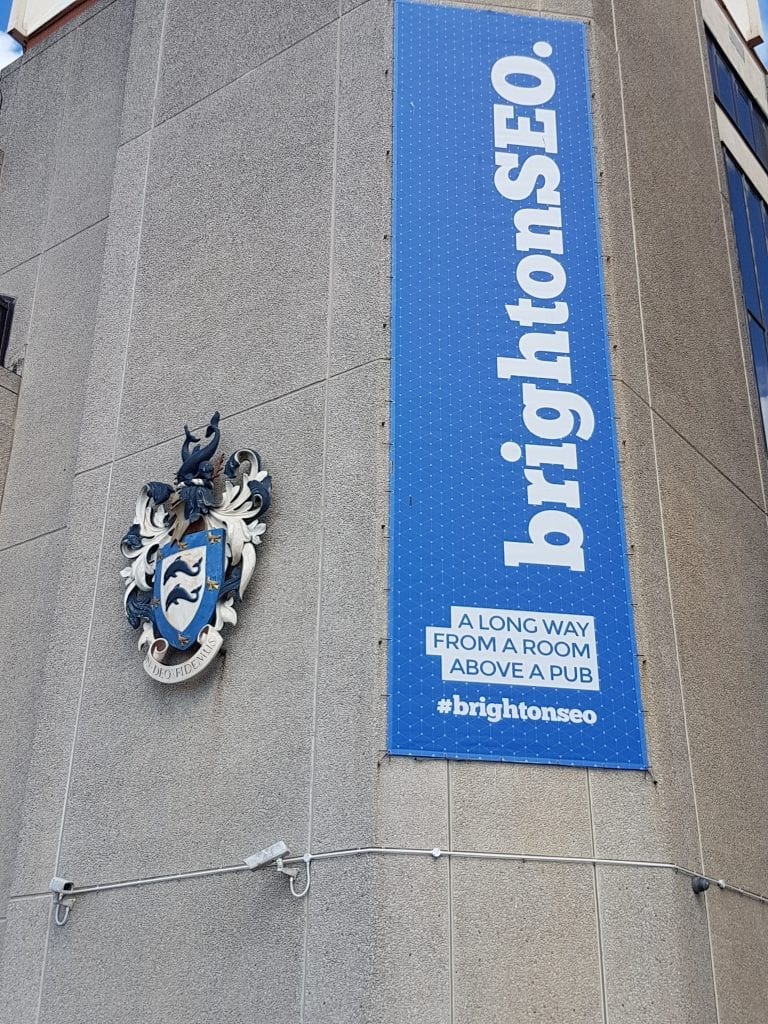 The BrightonSEO Conference brought together great digital marketing minds in the spacious Brighton Centre. The conference was an all-day event and was broken down into four sessions with a keynote at the end. The sessions touched on different aspects of digital marketing such as technical SEO, content, APIs (Application Programming Interface), PR, paid social, paid search, chat-bots, mobile and a variety of other related aspects.
The BrightonSEO Conference brought together great digital marketing minds in the spacious Brighton Centre. The conference was an all-day event and was broken down into four sessions with a keynote at the end. The sessions touched on different aspects of digital marketing such as technical SEO, content, APIs (Application Programming Interface), PR, paid social, paid search, chat-bots, mobile and a variety of other related aspects.
There was a plethora of information to consume from the variety of speakers that were on stage, flipping through slides of experiments, charts, codes and dashboards. The climax of the conference was having the opportunity to listen to the interview of Gary Illyes, Google’s Web Master Trend Analyst. Within the field of SEO, there are certain developments that seemed a bit unclear but the keynote session made people more enlightened and relaxed. Jennifer Slegg from the Search Engine Marketing Post conducted the interview and probed Gary to shed light on burning SEO issues.
The highlight of Brighton SEO was listening to the live interview of Gary Illyes, Google’s Web Master Trend Analyst. Share on XKey points from the interview with Google’s Gary Illyes (@methode)
- HTTPS: A few of the questions touched on the impact of HTTPS (Hyper Text Transfer Protocol Secure). HTTPS is important for security, user confidence and SEO. Gary stated that Google will not penalise any sites that fail to migrate to HTTPS in the future. However at Cariad we continue to see sites which have not converted to HTTPS dropping in organic rankings and therefore are not in total agreement with him, it would be good to see further evidence.
- Google’s Penguin Algorithm: He reemphasised that Google’s Penguin Algorithm is now in real real-time and we shouldn’t expect any further announcements or updates. However, a real-time status of Penguin does not prevent manual action or penalty in areas of unnatural link building. He reiterated that any manipulative process taken to acquire links to deceitfully influence rankings could lead to a manual action.
- Link Audit: Search engine optimisation professionals regularly audit the inbound links to a client’s website to spot the presence of any low-quality or unnatural link. Gary stated that regular link audits are purely a waste of time. He gave an example of how he rarely reviews the inbound links to his personal site that attracts over 100,000 visits a week. This was quite astonishing as many of the attendees felt running a regular link analysis would be helpful in preventing any link-related
- Using the Disavow Tool: Late last year, Gary stated that the Penguin 4.0 update would make the use of the disavow tool unnecessary. He did add, if it will make SEOs feel better, the tool could be used in an experimental way to ascertain impacts on ranking.
- Algorithm Updates and Fred: We were informed that Google makes about 2-3 algorithm updates a day. Gary asked the SEO community to name any unknown algorithm update as Fred. This was why webmasters woke up to fluctuations in traffic in March this year and it led to different blogs and comments on the possible causes of the algorithm adjustment.
- Mobile-First Indexation 2018: There were a few questions around Google’s plan to implement mobile-first indexation next year. Gary stated that mobile responsive websites do not have to make any change. He advised that companies with separate desktop sites will need to ensure there is a replica of content on both versions. In addition, webmasters are advised to maintain the ‘rel alternate’ tag and should refrain from adding any ‘rel canonical’
- Link Building: The question on broken link replacement was put forward to Gary. He enthused that there is nothing wrong with pursuing a broken link building strategy as long as there is contextual relevance. In essence, if we request a site’s owner to replace a broken outbound link on an existing article with ours, there has to be topical relevance. Google will ignore contextually irrelevant links and will refrain from transferring link equity.
- Accelerated Mobile Project (AMP): AMP is an open source initiative from Google that enables the creation of websites and ads that are consistently fast, appealing and powerful across devices and distribution platforms. In a nutshell, it does facilitate a faster user experience for mobile users. Gary told attendees that there is no rank boost for sites that implement The Google Trend Analyst also added that the search engine giant is looking into websites that utilise AMP but are publishing thin content and then referring users to the full site. Some of these sites implement these redirects to deceptively refer users to advertising served on their actual sites. Google is currently investigating websites with this structure.
Overall, the Brighton SEO Conference afforded digital marketing professionals with the unique opportunity to acquire knowledge across a wide range of topics. The keynote address was a climax to the entire event as it was great to get Google’s point of view on contemporary and conflicting search related topics.
